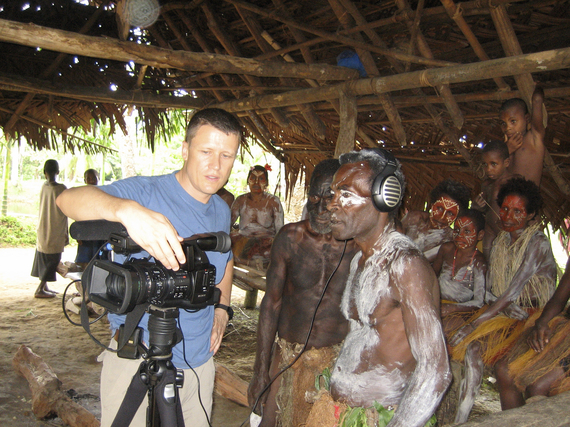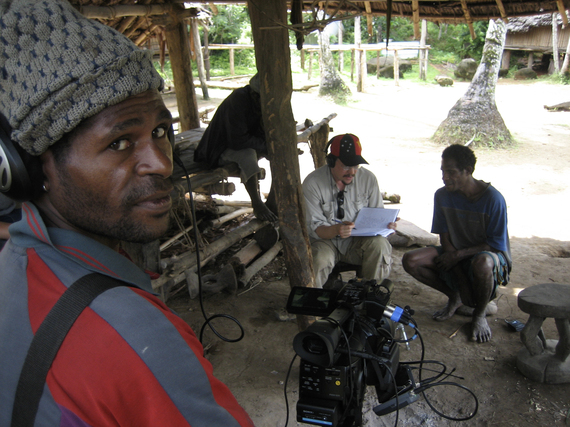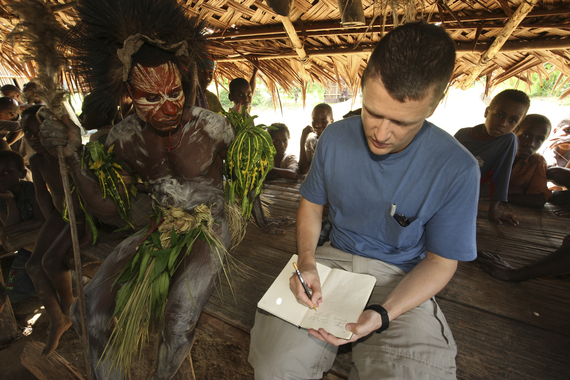We live in an age of endless information, an age where knowledge can be preserved and accessed as never before. But with major global languages dominating the internet, smaller languages may be left out, or even pushed down a pathway towards extinction.
Indigenous communities such as the Yokoim and Panim peoples of Papua New Guinea (PNG), though they have little or no internet access, are eager to cross the digital divide and engage a global audience by sharing their languages on the world wide web.
Linguist David Harrison shows Yokoim speaker Nick Waikai the video playback of his water spirit myth, while Merilyn Waikai and other family members, dressed in ceremonial attire, look on. (Photo by Chris Rainier)
To support those efforts, the National Geographic Enduring Voices Project has just launched two new "Talking Dictionaries" for Yokoim and Panim, two small and endangered languages making their internet debut in 2014.
Yokoim is spoken by under 2,000 people in three small villages in the Karawari River basin of Papua New Guinea. Locals travel only by dugout canoe, while outsiders fly in by small planes that land on a dirt airstrip cleared out in the jungle. Though most children in the Yokoim community prefer to speak Tok Pisin, the national language, a proud speaker named Luis Kolisi composes and sings original songs in the language. Video recordings of Luis' songs provide a way for his unwritten language to be shared on the internet.
Nick Waikai, headman of Manjamai village, told our research team about a mythical hero named Waka who brought survival skills to his people. As the tale goes, Waka was captured by river spirits and taken to live underwater for a month. The netherworld spirits schooled Waka in skills such as canoe making, hunting, and bow and arrow making. When Waka emerged from underwater into the world of the living, he taught his Yokoim people those skills. Now the Yokoim are seeking a new set of skills for the digital age.
Panim is spoken by under 400 people in a single village (also called Panim) near the northeast coast of Papua New Guinea, and is highly endangered. When linguists Greg Anderson and David Harrison visited the village on a Saturday in August 2009, almost the entire village population was busy attending Seventh Day Adventist church services. One man, Lihot Wagadu, who was not at church sat down with the linguists and shared some of his language.
The new Talking Dictionaries, hosted at Swarthmore College, contain the first available recordings of Yokoim and Panim. As both are unwritten languages, the dictionaries use the International Phonetic Alphabet, a system used by linguists to represent the sounds of any language.
It is a true milestone as Yokoim and Panim cross the digital divide and establish a very first internet presence. That these tongues, likely never before heard outside of remote villages in Papua New Guinea, can now reach a global audience, shows a positive value of globalization. By learning about such far-flung and remote cultures, and the ideas, songs, and experiences they choose to share with us, we may learn to value them and perhaps contribute to their survival.
Yokoim speaker Luis Kolisi (left) and linguist Greg Anderson interview Ivino Sabakui (right), a speaker of the Womut language. Wamburmas Village, Papua New Guinea. (Photo by David Harrison)
Nick Waikai, Yokoim speaker and councilman of Manjamai village, dressed in ceremonial attire, teaches linguist K. David Harrison some Yokoim words. (Photo by Chris Rainier)
Some words from Panim and Yokoim:
Panimna'ag - egg; smallɓaɓalit - butterflykuku dugwa - to carry a child on one's shoulderehega - to carry something on one's headisamega - to boil something with the skin on
There are also distinct Panim terms for wind from the sea, east wind, wind from the bush, west wind, south wind, and north wind.
Yokoimaliŋ - yesterday; tomorrowsawija - shell moneypunʤuŋ - sago trunksanbo - black and white pigsamburuŋ - partly black pigkamdaŋ - fish-carrying basketkabaŋ - three-pronged fish spearpajnbɨn mɨnaŋ - pronged canoe paddle for menakunbun mɨnaŋ - leaf-shaped women's canoe paddle
This work is the result of the Enduring Voices Project, a joint effort between the National Geographic Society and the Living Tongues Institute for Endangered Languages. The 2009 research expedition and later follow-up trips were funded by National Geographic. Project linguists include Greg Anderson, K. David Harrison, Don Daniels, Madeleine Booth, and Jeremy Fahringer. Indigenous consultants include: (for Panim) Segena Som, Deb Molem, and Lihot Wagadu; (for Yokoim) Luis Kolisi, Nick Waikai, Merilyn Waikai, and Felix Andi. National Geographic Fellow Chris Rainier photographed the expedition.


